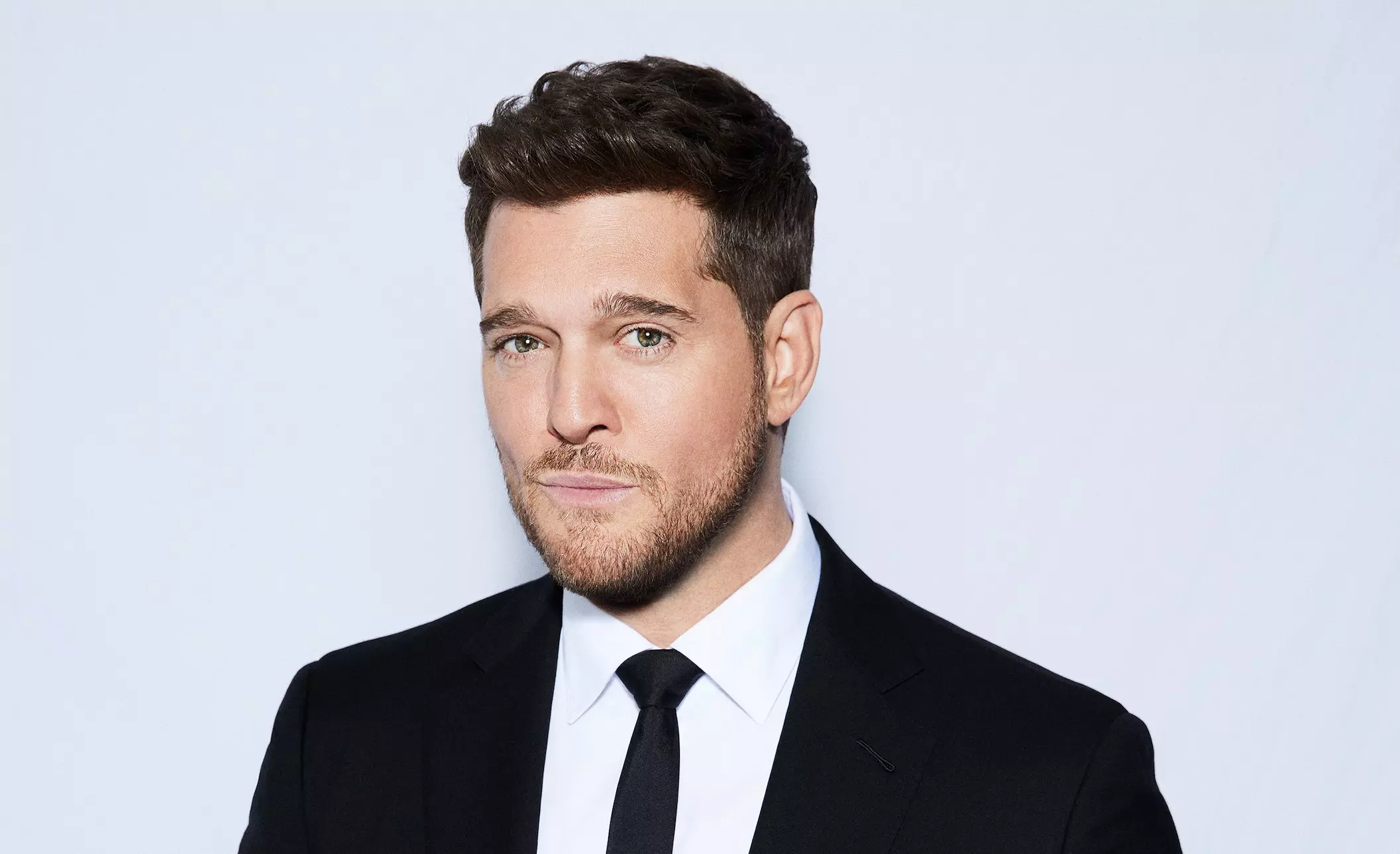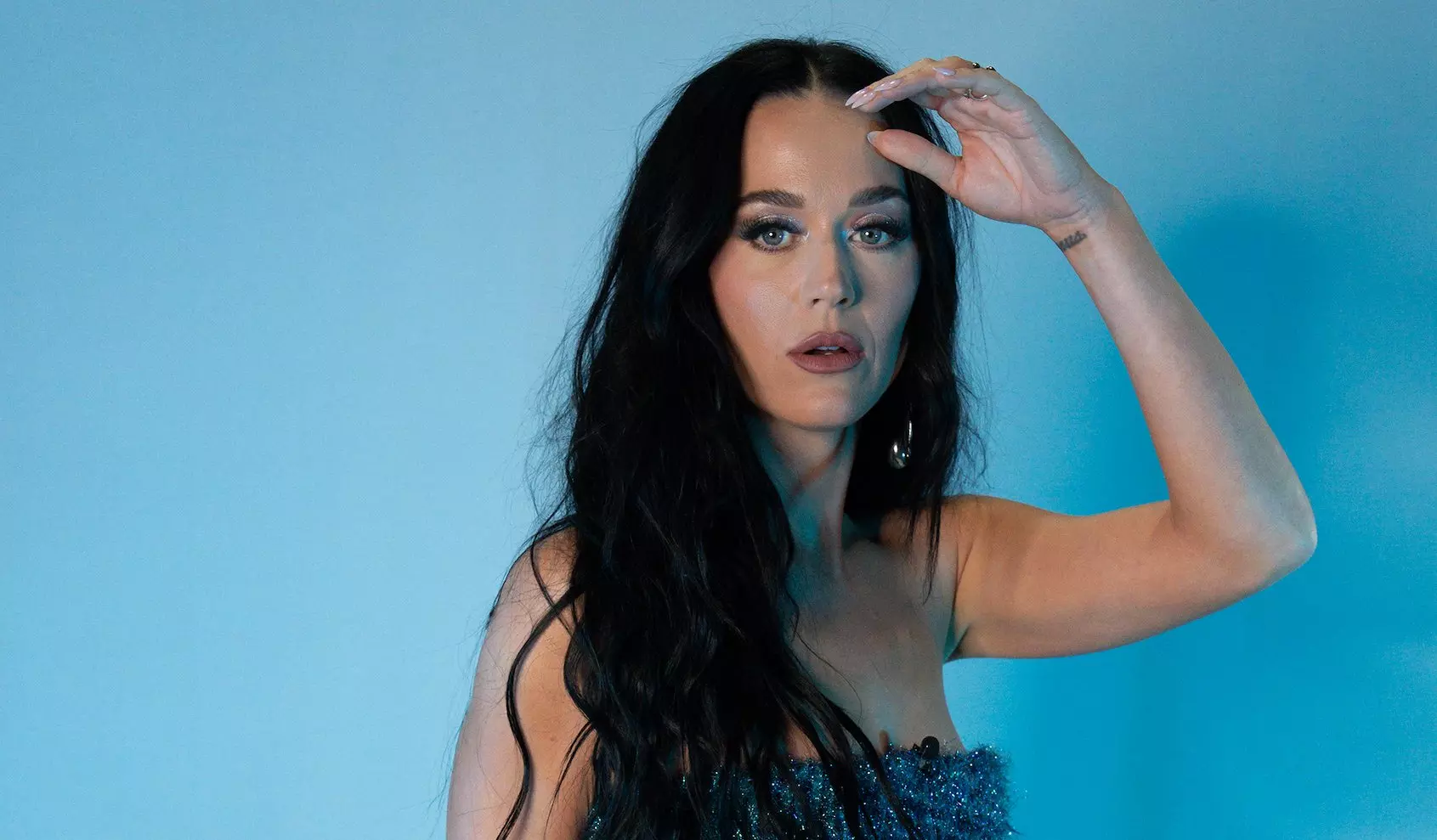Photo: Kevin Mazur/Getty Images for The Recording Academy
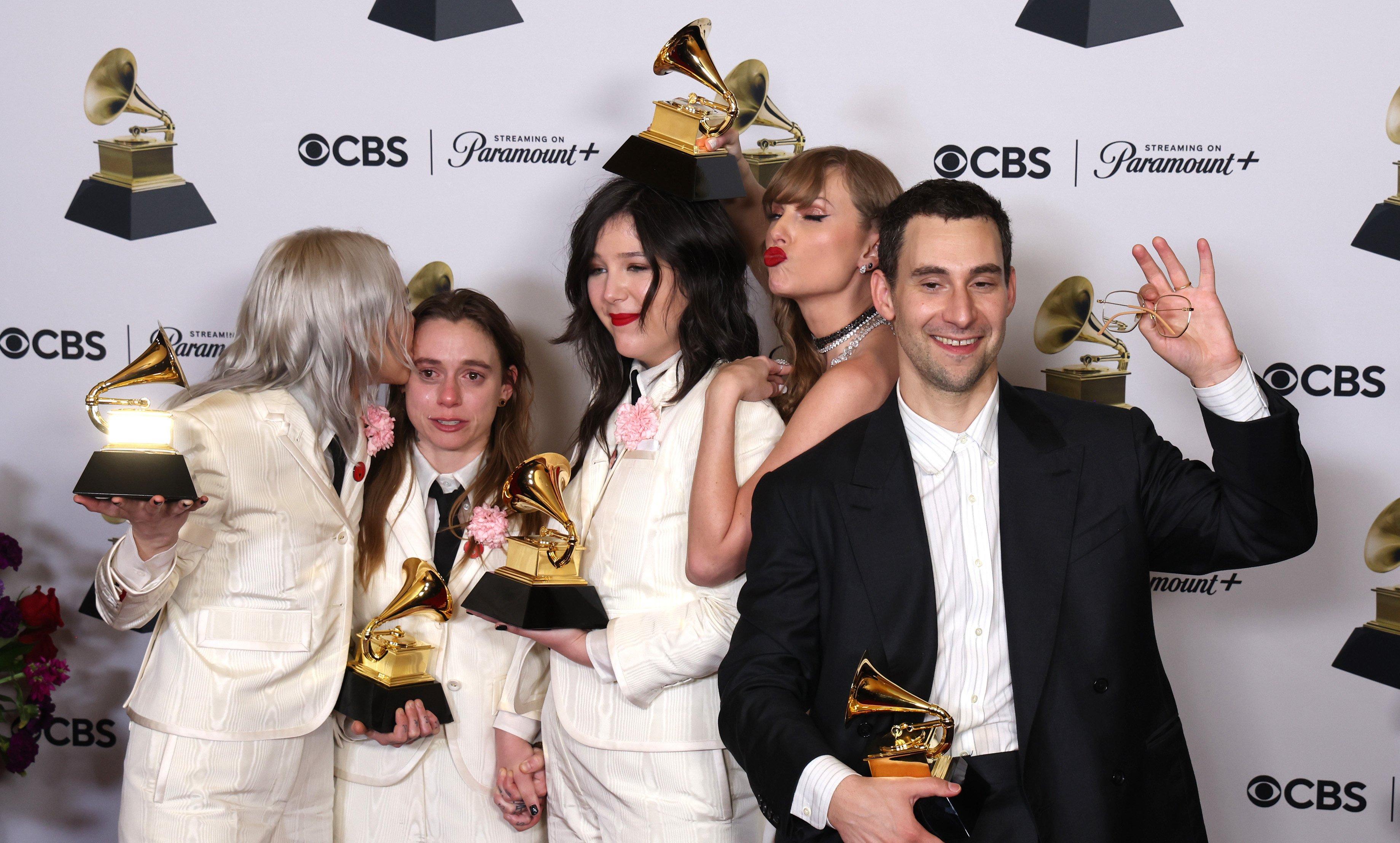
news
10 Must-See Moments From The 2024 GRAMMYs: Taylor Swift Makes History, Billy Joel & Tracy Chapman Return, Boygenius Manifest Childhood Dreams
The 66th Annual GRAMMY Awards wrote another monumental chapter in music history with returns from legends like Celine Dion and wins by a promising new generation of artists like Victoria Monét.
Just like that, another GRAMMYs has come and gone — but the 2024 telecast brought many moments that will be immortalized in pop culture history.
It was the evening of legends, as Billy Joel and Tracy Chapman returned to the stage for the first time in decades and Joni Mitchell made her debut with a performance of her 1966 classic, "Both Sides, Now." Stevie Wonder and Celine Dion honored greats, both those we've lost and those who are dominating today. And Meryl Streep had two memorable moments at the show, making a fashionably late entrance and getting a hilarious GRAMMY lesson from Mark Ronson.
But it was the younger generation of artists who ultimately dominated the show. Boygenius — the supergroup of Phoebe Bridgers, Lucy Dacus, and Julien Baker — won numerous awards in the Rock, Metal & Alternative Music Field. Billie Eilish and SZA scooped up a couple more golden gramophones, respectively, and Best New Artist winner Victoria Monét celebrated three wins in total, also winning Best R&B Album and Best Engineered Album, Non-Classical.
Taylor Swift built on the momentum of her colossal year with more GRAMMY records and an unexpected announcement of her next studio album.
Check out the full list of winners here, and take a look at our top 10 highlights from another show-stopping installment of the GRAMMYs below.
Boygenius Run To Accept Their First GRAMMY Award
Boygenius won the first trophy of their careers during the Premiere Ceremony, and they were so ecstatic they sprinted through the crowds to get to the stage.
"Oh my God, I want to throw up," Lucy Dacus said as the group accepted their Best Rock Performance trophy for "Not Strong Enough."
Even though the trio was over the moon, they weren't entirely shocked by their win: "We were delusional enough as kids to think this would happen to us one day," she continued. Phoebe Bridgers would sing at a local Guitar Center "in hopes of getting discovered," while Julien Baker dreamed of performing in stadiums as she played in multiple bands, and Dacus has been perfecting her acceptance speech for years.
Their hard work was manifested three times over, as the trio also won Best Rock Song for "Not Strong Enough" and Best Alternative Music Album for the record.
Killer Mike Makes A Clean Sweep
Killer Mike had the largest GRAMMY night of his career, winning all three of the Rap Categories for which he was nominated: Best Rap Performance and Best Rap Song for "SCIENTISTS & ENGINEERS," and Best Rap Album for MICHAEL.
"I'm from the Southeast, like DJ Paul, and I'm a Black man in America. As a kid, I had a dream to become a part of music, and that 9-year-old is very excited right now," he cheered. "I want to thank everyone who dares to believe art can change the world."
Minutes after his sweep, the LAPD detained the Run the Jewels rapper. However, he was released and still able to celebrate his achievements, Killer Mike's lawyer told Variety.
Miley Cyrus Finally Receives Her "Flowers"
Miley Cyrus entered the GRAMMYs with six nominations for her eighth studio album, Endless Summer Vacation. After she won Best Pop Solo Performance for "Flowers," she delivered a jubilant performance in celebration. "Started to cry, but then remembered, I just won my first GRAMMY!" she exclaimed at the song's bridge, throwing her hands in the air and joyfully jumping around the stage.
Cyrus' excitement brought a tangible energy to the performance, making for one of the night's most dynamic — and apparently one of Oprah Winfrey's favorites, as the camera caught the mogul dancing and singing along.
"Flowers" earned Cyrus a second GRAMMY later in the night, when the No. 1 hit was awarded Record Of The Year.
Tracy Chapman Makes A Rare Appearance
Luke Combs breathed a second life into Tracy Chapman's "Fast Car" when he released a cover of the track in April 2023. He quickly climbed to the top of the Billboard charts and received a nomination for Best Country Solo Performance at this year's show. Of course, it called for a special celebration — one that was meaningful for both Combs and GRAMMYs viewers.
Chapman joined the country star on stage for her first televised performance since 2015, trading off verses with Combs as he adoringly mouthed the words. The duet also marked Chapman's first appearance on the GRAMMY stage in 20 years, as she last performed "Give Me One Reason" at the 2004 GRAMMYs. (It also marked her second time singing "Fast Car" on the GRAMMYs stage; she performed it in 1989, the same year the song won Best Pop Vocal Performance, Female and Chapman took home three awards total, including Best New Artist.)
Naturally, Chapman's return earned a standing ovation from the crowd. As Combs fittingly put it in an Instagram post thanking the Recording Academy for the opportunity, it was a "truly remarkable moment."
Read More: 2024 GRAMMY Nominations: See The Full Winners & Nominees List
Joni Mitchell Takes The GRAMMY Stage For The First Time At 80
In one of the most emotional parts of the night, Joni Mitchell performed on the GRAMMYs stage for the first time in her nearly 60-year career.
Accompanied by Brandi Carlile — who referred to Mitchell as "the matriarch of imagination" before the performance — Lucius, SistaStrings, Allison Russell, Blake Mills, and Jacob Collier, Mitchell sang a touching rendition of "Both Sides Now."
"Joni is one of the most influential and emotionally generous creators in human history," Carlile added in her introduction. "Joni just turned 80, my friends, but we all know she's timeless!"
Mitchell also won her 10th golden gramophone at the 2024 GRAMMYs, as her live album Joni Mitchell at Newport was awarded Best Folk Album at the Premiere Ceremony.
Stevie Wonder Salutes The Late Tony Bennett, Duetted By His Hologram
Another heartfelt moment came during this year's In Memoriam segment, when Stevie Wonder memorialized his friend, Tony Bennett, who passed away from Alzheimer's disease in 2023.
"Tony, I'm going to miss you forever. I love you always, and God bless that He allowed us to have you in this time and space in our lives," Wonder proclaimed. Thanks to a hologram of Bennett, the two singers could duet "For Once in My Life" one last time.
This year's tribute also saw Annie Lennox covering Sinéad O'Connor's "Nothing Compares 2 U," Jon Batiste's medley of Bill Withers' hits, and Fantasia's reimagining of Tina Turner's "Proud Mary."
Meryl Streep Gets Educated On Album Vs. Record And Single
Mark Ronson presents with his mother-in-law Meryl Streep at the 2024 #Grammys pic.twitter.com/mueXlmJarX
— The Hollywood Reporter (@THR) February 5, 2024
Meryl Streep joined Mark Ronson — who happens to be her son-in-law — to announce the Record Of The Year winner, which sparked a funny interaction between the two when Streep thought she was announcing Album Of The Year.
"A record is an album!" Streep confidently declared, only for Ronson to give a quick 101 on the difference between Record, Song, and Album Of The Year.
"It's a really important award, and it's an award that recognizes everything that goes into making a great record — the producers, the recording engineer, and the artist, and all their contributions," Ronson explained of Record Of The Year.
"It's the Everything Award! It's the best," Streep smiled.
Celine Dion Surprises The World With A Special Cameo
Before the GRAMMYs commenced, producer Ben Winston told viewers they would be in for a treat because of a surprise presenter for the final award of the night, Album Of The Year. "They are an absolute global icon. I think jaws will drop to the floor. People will be on their feet," he shared.
It was none other than Celine Dion, who has largely been out of the limelight after her stiff person syndrome diagnosis.
"When I say that I'm happy to be here, I really mean it with my heart," Dion said. "It gives me great joy to present a GRAMMY award that two legends, Diana Ross and Sting, presented to me 27 years ago."
Dion is referring to her Album Of The Year win at the 39th GRAMMY Awards in 1997, when her smash LP Falling Into You won the honor.
Taylor Swift Breaks The Record For Most AOTY Wins
It was a historic night for Taylor Swift in more ways than one.
She began the evening by winning her 13th GRAMMY for Best Pop Vocal Album for Midnights. To commemorate the milestone (13 is her lucky number), Swift announced her 11th studio album, The Tortured Poets Department, arriving on April 19.
She ended the evening with a coveted fourth Album Of The Year win, which made Swift the artist with the most AOTY nods in GRAMMY history.
"I would love to tell you this is the best moment of my life, but I feel this happy when I finish a song or crack the code to a bridge that I love or when I'm shot listing a music video or when I'm rehearsing with my dancers or my band or getting ready to go to Tokyo to play a show," she said. "The award is the work. All I want to do is keep being able to do this."
Billy Joel Serves Double GRAMMY Duty
After Swift's momentous win, Billy Joel ended the ceremony with a feel-good performance of his 1980 single, "You May Be Right." Along with being a rousing show closer, it was also his second performance of the night; Joel performed his newest offering, "Turn the Lights Back On," before Album Of The Year was announced.
Joel's performances included three firsts: It was the debut live rendition of "Turn the Lights Back On," his first release since 2007, and the performances marked his first time playing on the GRAMMYs stage in more than two decades. It was a fitting finale for a history-making show, one that beautifully celebrated icons of the past, present and future.
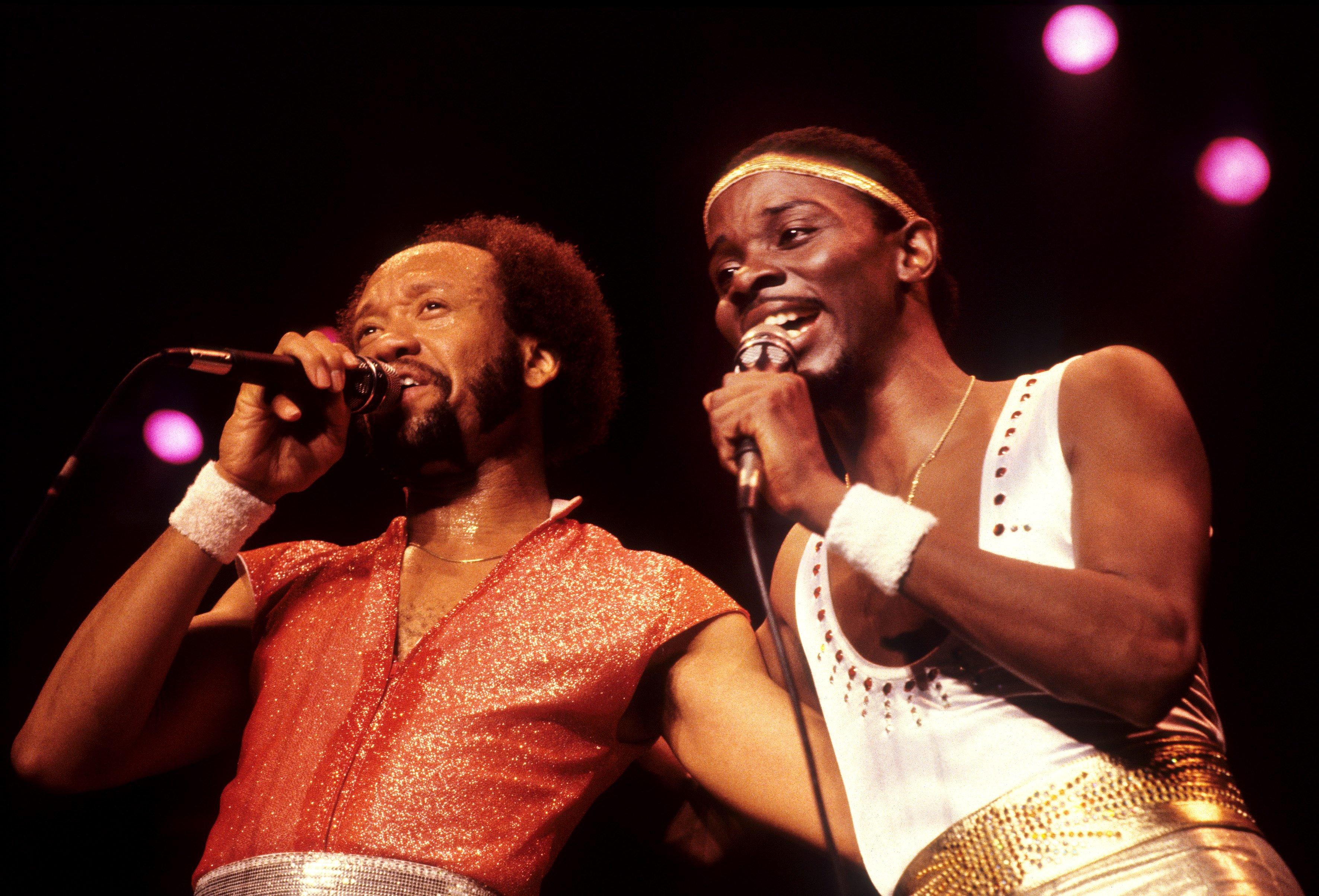
Photo: Rob Verhorst/Redferns
list
Gratitude Playlist: 20 Songs Celebrating Thankfulness
From Dido's "Thank You" and William DeVaugh's classic reminding you to be thankful for what you've got, this playlist highlights songs that give thanks for everything from the clothes on your back to the friends in your life.
Thanksgiving marks the start of the holiday season, which is often a time of reflection. There's much music befitting this time of year, much of which isn't holiday specific.
Songs tackling this theme — whether about gratitude for love, for platonic relationships, or for life's gifts — have a long history in pop music. Through these songs, we’re reminded of our own journeys and the common ground we share with others, building a collective sense of empathy and understanding. As a result, their messages become timeless; their themes fit for any time of year.
And while there are plenty of Thanksgiving-specific works out there — here's looking at you "Stretchy Pants" and "Do The Mashed Potatoes" — the following playlist leans into the myriad and everyday ways we give thanks. Before you "turkey trot" over to your holiday table, here are some songs that capture the spirit of love, gratitude, and self-reflection.
Alanis Morissette — "Thank U" (1998)
Alanis Morissette reflects and expresses gratitude for the challenging moments that have shaped her. The song's lyrics imbue listeners with a sense of peace among life’s hardships: "How 'bout unabashedly bawling your eyes out?/How 'bout not equating death with stopping?"
Morissette's lyrical vulnerability was likely due in part to the challenges during her teen years, including an eating disorder. As a musician, she continued to write frankly about heartbreak and identity — themes which resonate with generations of fans. She continues to be grateful for the healing power of music, the support of her fans, and the journey of self-discovery that has allowed her to grow personally and artistically.
Rita Ora — "Grateful" (2014)
This ballad from the 2014 film Beyond the Lights highlights the importance of being thankful for the obstacles that lead to personal growth. Ora’s soaring vocals are filled with sincerity and heart. Written by Diane Warren, the song reminds us that the struggles we face can ultimately shape us into stronger, more compassionate individuals. “I'm grateful for the storm/Made me appreciate the sun/ I'm grateful for the wrong ones/Made me appreciate the right ones." One particularly potent line notes, "I'm thankful for all my scars/'Cause they only make my heart."
Natalie Merchant — "Kind and Generous" (1998)
A timeless, smooth tribute to someone who has been kind and giving, this song radiates gratitude with a chorus that invites everyone to say "thank you." Merchant never revealed if the song is about any one individual, and as a result it is broadly relatable. As a matter of fact, some refer to it as the "Thank You" song, even though its title is "Kind and Generous."
Dido — "Thank You" (2000)
This tender, honest classic conveys gratitude for someone who has a grounding presence in Dido’s life. With gentle vocals and a mellow beat, the song is a reminder of the restorative power of human connection. "The morning rain clouds up my window/ And I can't see at all/And even if I could, it'd all be gray," Dido sings in the song's opening verse. "But your picture on my wall/It reminds me that it's not so bad."
"Thank You" was sampled in part for Eminem’s “Stan,” demonstrating the song's impact across diverse genres. Eminem's titular character is an obsessive fan who takes Eminem’s lyrics literally, causing Stan to go into a harmful depression. While the relationship to Dido’s original song is different, Eminem’s figurative Stan spends a good chunk of time reflecting on how important the rapper is to him. By the end of the song, Eminem realizes how, in relationships, gratitude can be vital.
Chance the Rapper — "Blessings" (2016)
Chance’s gospel-tinged anthem from the album Coloring Book is an ode to the blessings in his life. The song emphasizes gratitude and the importance of recognizing the good in life, even amidst hardship.
The lyrics reference God and faith while celebrating Chance’s spirituality and showing appreciation for the strength it provides.
ABBA — “Thank You For the Music” (1978)
Swedish pop group ABBA give thanks for the gift of song, reflecting on the way music nourishes our existence as artists and fans. Written by Benny Andersson and Björn Ulvaeus, it's a personal anthem and a universal hymn to song: "Thank you for the music, the songs I'm singing/Thanks for all the joy they're bringing/Who can live without it, I ask in all honesty/What would life be?" the band wonders.
OneRepublic — "Good Life" (2010)
In "Good Life," OneRepublic revel in living in the moment and loving the beauty of life, even when things don't go according to plan. The lyrics describe the ups and downs of touring, while reflecting on the importance of appreciating the simple things.
The refrain "Oh, this has gotta be the good life" acknowledges life's blessings, while "I feel like there might be something that I’ll miss" reminds us to appreciate what we have now before it’s gone.
Mahalia — "Grateful" (2019)
On this soulful, mellow track, British R&B singer Mahalia reflects on her journey and expresses gratitude for love and the experiences that come with it. Through lyrics like "If I never had to cry, I would never learn to fight" and "I needed to fall so I could get stronger," Mahalia acknowledges that her challenges were essential to her development and strength. Mahalia also expresses deep appreciation for the support systems that guided her, as she recalls praying for better days and trusting that someone would help light the way.\
Kelly Clarkson — "Thankful" (2003)
The title track of her debut album, this heartfelt expression of gratitude sings the praises of someone who has been a rock in Kelly Clarkson's life. The track is uplifting and feel-good — an appropriate vibe for such appreciation. Lyrics “That I'm thankful/For the blessing/And the lessons that I've learned with you/By my side” encapsulate Clarkson's heartfelt gratitude for the love, support, and personal growth she has experienced through a meaningful relationship.
Earth, Wind & Fire — "Gratitude" (1975)
This classic funky tune expresses deep appreciation and positive vibes with the perfect blend of groove and heartwarming thanks. The band members have often shown gratitude for their ability to bring people together, regardless of background, through their songs such as "Shining Star" and "That's the Way of the World."
These lyrics convey gratitude by recognizing the gifts of love, peace, freedom, and divine intervention with a gospel-influenced refrain. "Open up your heart, let your body find/Freedom in your stride, love and peace of mind, yeah/One more time and we got to say/That the Good Lord gonna make a way/Gonna make a way, gonna make a way."
William DeVaughn — “Be Thankful For What You Got” (1974)
R&B singer William DeVaughn's classic encourages reflection on life's simple blessings, focusing on inner fulfillment over external wealth. By promoting a humble mindset — "Though you may not drive a great big Cadillac/Gangsta whitewalls/TV antennas in the back/You may not have a car at all/But remember brothers and sisters/You can still stand tall/Just be thankful for what you've got" — the song teaches that true happiness comes from within. A song that has been covered many times over, "Be Thankful" is not only a catchy reminder to do just that, but a working-class anthem that champions self-worth.
Ariana Grande — “thank u, next” (2019)
Ariana Grande has had a lifetime of relationships to learn from, and expresses gratitude for past relationships and the lessons they taught her on this bop. Rather than focusing on bitterness or regret, “thank u, next” is part kiss-off and part positive embrace: "Look what I got/Look at what you taught me/And for that, I say/Thank you, next." Grande is spending more time with her friends and even met someone new; but nothing good comes without acknowledging how every relationship contributed to her resilience, self-awareness, and maturity.
Boyz II Men — "Thank You" (1994)
This R&B track from their GRAMMY-winning album II, acknowledges the people who lift us up when things are gloomy. This feel-good song not only showcases Boyz II Men's vocal talent but also spreads positivity, encouraging us all to recognize and cherish the people who make a difference in our lives.
The lyrics are both earnest and direct: "All through my life/I knew that you'd be my world/Knowing everywhere I go/Things you taught me, they would show/So many times and changes/You've seen me through/I sure 'nough wouldn't have survived without you."
Sam & Dave — "I Thank You" (1968)
A classic in soul music, this track is a high-energy appreciation song, thanking a lover for bringing joy and happiness. Its infectious groove and repetitive verses ("You didn't have to love me," "You didn't have to squeeze me," "You didn't have to hold me like you did," the duo belts) has kept it timeless across generations.
Celine Dion — "Thankful" (2013)
In this ballad, Celine Dion thanks the people who supported her through her journey with her signature vocal bombast. "I'm thankful to be here, thankful to feel clear/thankful my prayers have been answered" capture the GRAMMY winner's deep sense of gratitudes. She further reflects on the support and love she’s received with lines like "I'm thankful you listened, thankful to heaven, thankful for feeling alive again." The lyrics highlight the resilience she's drawn from her loved ones and the unbreakable bonds that have shaped her life and career.
Carrie Underwood — "Thank God for Hometowns" (2012)
Carrie Underwood pays tribute to the grounding force of small-town life, reminding listeners to be grateful for the roots that keep them steady through life’s trials. The lyrics "Thank God for hometowns/And all the love that makes you go round/Thank God for the country lines that welcome you back in" define a sense of belonging and acknowledge the tight-knit support of a community. The song in its entirety is an expression of thankfulness for the grounding that home provides, symbolizing the comforting feeling of returning to a familiar, safe place.
Bing Crosby — "Count Your Blessings Instead of Sheep" (1952)
A holiday classic that has transcended its seasonal label, this song gently reminds us to practice gratitude and center our attention on the blessings in our lives, no matter how small. Lyrics "When I'm worried, and I can't sleep/ I count my blessings instead of sheep" encourage listeners to shift their focus away from daily troubles. Its message continues to resonate across generations, making it a go-to track for anyone seeking solace.
Whitney Houston — "My Love Is Your Love" (1998)
The title track from Whitney Houston's fourth album, "My Love Is Your Love" showcases a message of unconditional love and gratitude for deep, lasting relationships. Houston’s vocals are filled with sincerity, highlighting the power of love beyond material wealth: "If I lose my fame and fortune, and I'm homeless on the street, and I'm sleeping in Grand Central Station/it's okay if you're sleeping with me." Whitney expresses that she can endure any hardship by devoting her love to the partner that stands with her no matter what the circumstance.
Joni Mitchell — "Big Yellow Taxi" (1970)
Though a cautionary tale, this folk classic reminds us to appreciate what we have before it’s gone. Joni Mitchell’s poetic lyrics offer a bittersweet reflection on gratitude for the environment and life’s beauty. The lyric "They paved paradise and put up a parking lot" is a contrast, lamenting the loss of natural beauty and implying that humanity fails to appreciate the beauty in life until it's irreversibly altered. While talking in a broader sense about destroying nature, this song holds true even today as discussions take place regarding climate change.
Sly and the Family Stone — "Thankful N' Thoughtful" (1973)
From Sly and the Family Stone, this track leans more into reflection and being thankful for life’s experiences, both good and bad, with a funky backdrop. The funketeers have multiple songs about gratitude, including "Everyday People," "Life," and "Thank You (Falettinme Be Mice Elf Agin)." The uplifting messages in their songs show appreciation for life and unity while embodying the human experience.
Latest News & Exclusive Videos

Khatia Buniatishvili Plays "Mephisto-Waltz No.1"
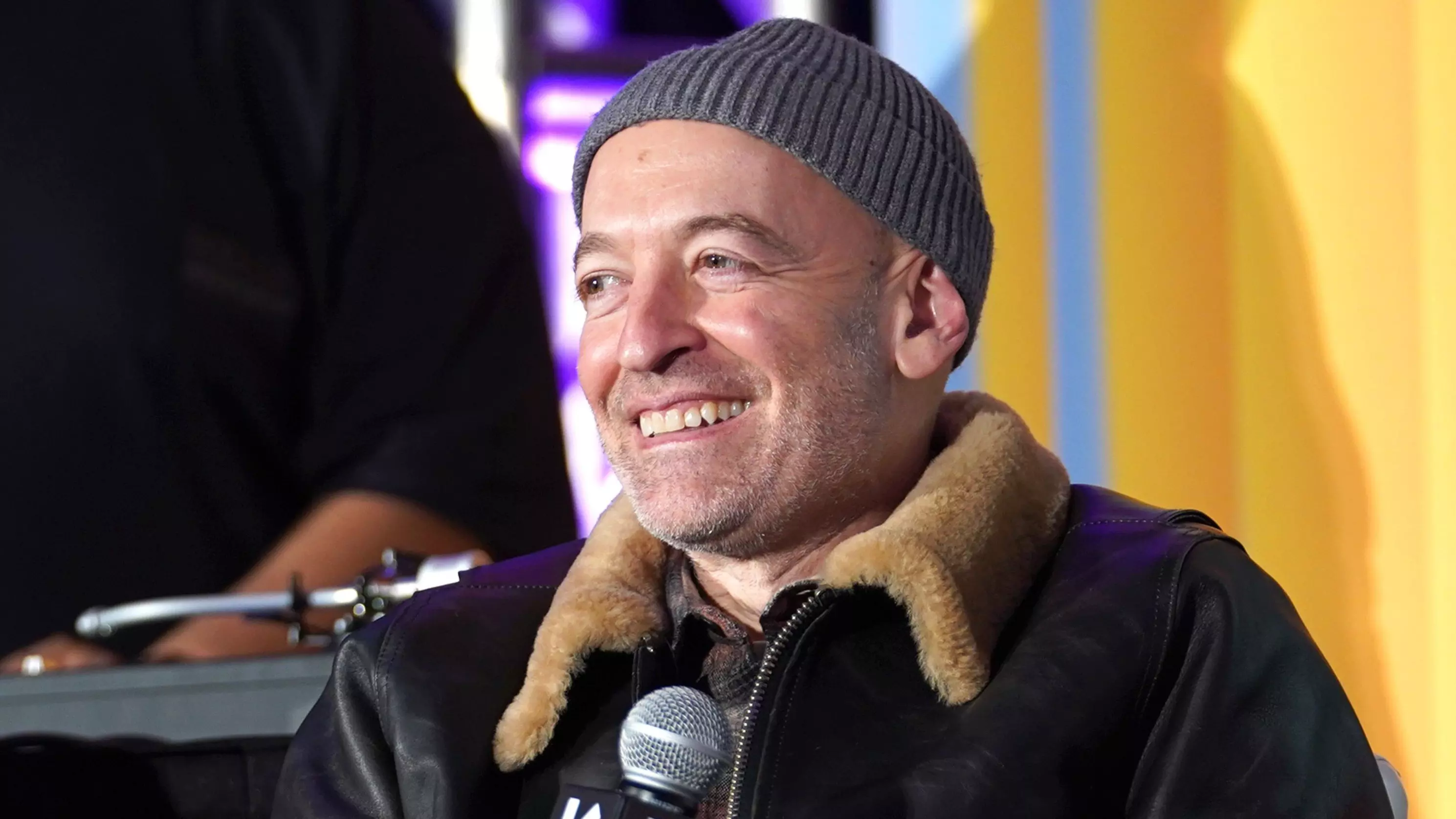
Peanut Butter Wolf Talks New Campus Christy Album & What's Next For Stones Throw

Warner Music Group's Paul Robinson To Be Honored With 2025 Entertainment Law Initiative Service Award

Your Vote, Your Voice: 6 Reasons Why Your GRAMMY Vote Matters

JOHNNYSWIM Reveal The Mic That Defines Their Sound
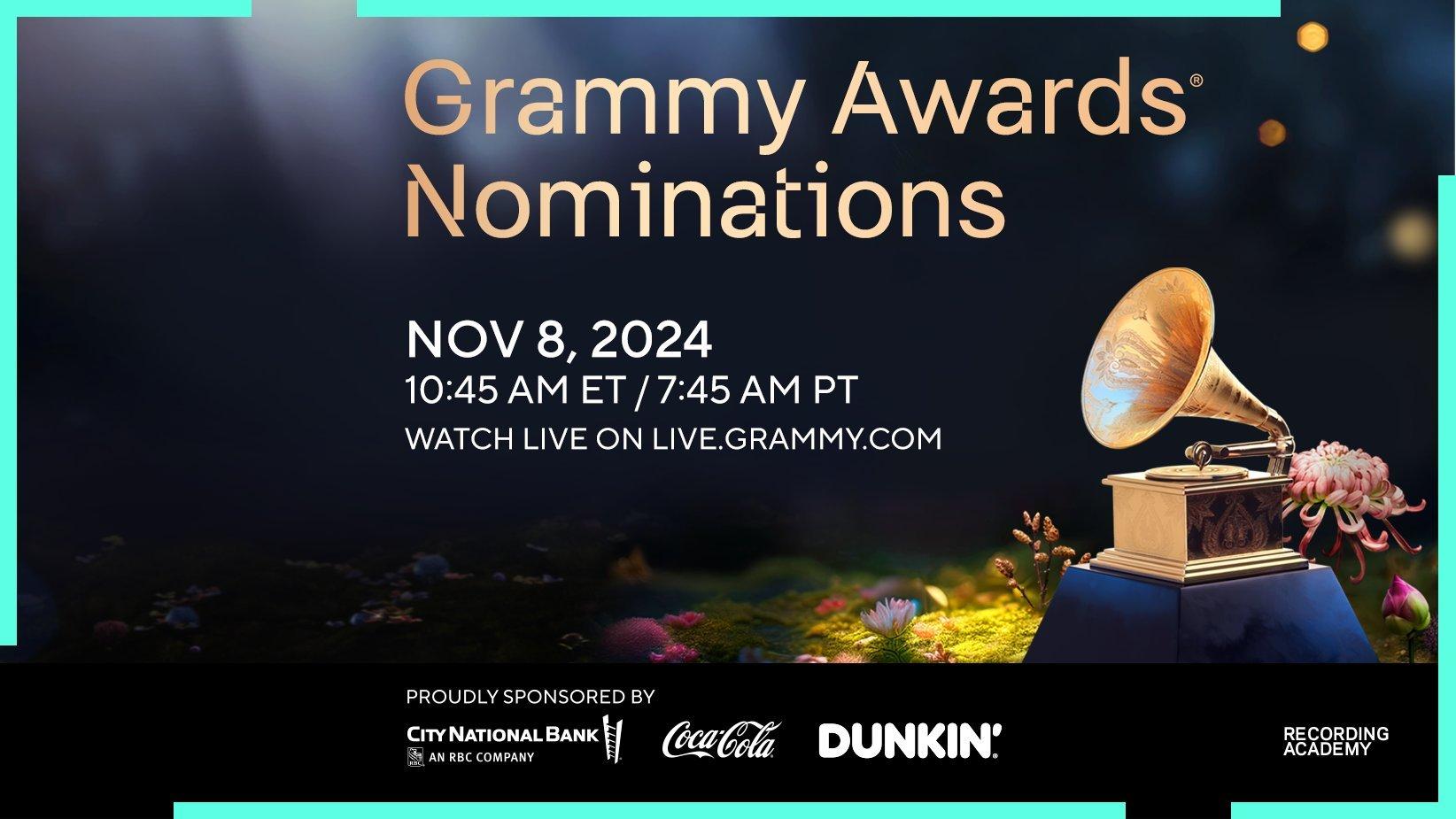
Graphic courtesy of the Recording Academy.
news
How To Watch The 2025 GRAMMY Nominations: Mark Ronson, Kylie Minogue, Victoria Monét, Brandy Clark, Kirk Franklin & More To Announce The Nominees; Streaming Live Friday, Nov. 8
Watch the 2025 GRAMMYs nominations live on live.GRAMMY.com and YouTube starting at 7:45 a.m. PT / 10:45 a.m. ET. Read on for everything you need to know about nominations, which will be announced on Friday, Nov 8.
The 2025 GRAMMYs season is officially here. The 67th GRAMMY Awards nominations will take place on Friday, Nov. 8, 2024 at 7:45 a.m. PT / 10:45 a.m. ET, featuring guest appearances from multiple GRAMMY-winning artists, including Mark Ronson, Kylie Minogue, Victoria Monét, Brandy Clark, Kirk Franklin, and others.
Then, it's the main event: The 2025 GRAMMYs, officially known as the 67th GRAMMY Awards, take place Sunday, Feb. 2. The ceremony will be held at Crypto.com Arena in Los Angeles, broadcast live on the CBS Television Network and streamed live and on demand on Paramount+.
The GRAMMY Awards celebrate the artistic excellence that defined the year in music. As music's only peer-recognized accolade, the Academy’s Voting Member body — made up of active music creators representing more than 22 different music genres and over 13 creative disciplines, including songwriters, composers, producers, engineers, and more — are eligible to vote for the GRAMMY Awards. These members ultimately determine the nominees and winners on Music's Biggest Night.
Check below for a full guide to the 2025 GRAMMYs nominations livestream event happening next week proudly sponsored by City National Bank, Coca-Cola, and Dunkin'.
Follow "Recording Academy/GRAMMYs" on X, Instagram, Facebook, TikTok, and LinkedIn, and use #GRAMMYs to join the conversation as it unfolds on Nov. 8.
How Can I Watch The 2025 GRAMMY Nominations?
Watch the full 2025 GRAMMYs nominations livestream event on live.GRAMMY.com, your go-to destination for all things GRAMMYs all year long — 24/7, 365, and the Recording Academy's YouTube channel.
This year, the Recording Academy is revolutionizing the GRAMMY digital experience with the improved live.GRAMMY.com, a dynamic, expansive online experience providing music fans a backstage view into Music's Biggest Night. Featuring a multi-screen livestream you can control, live.GRAMMY.com is where you can watch all the highlights from the 2025 GRAMMYs in one place before, during and even after the telecast. Catch GRAMMY performances, acceptance speeches, the GRAMMY Live From The Red Carpet livestream special, the full Premiere Ceremony livestream, behind-the-scenes backstage moments, and so much more.
Updating in real time, live.GRAMMY.com gives music fans an exclusive peek into this year's official GRAMMY Week celebrations, a multi-camera video feed giving fans a true 360-view into the GRAMMY Awards, and exclusive articles, performances, interviews, and videos.
When Are The 2025 GRAMMY Nominations Announced?
The 2025 GRAMMY nominees will be unveiled during a livestream event on live.GRAMMY.com and YouTube, kicking off with a special presentation announcing the nominees in the General Field and select Categories. Video announcements of the nominees in the remaining Categories will also be published on live.GRAMMY.com and YouTube while the event is underway, and the full list of nominees will be published on GRAMMY.com immediately following the presentation. Nominees will also be announced via a press release.
The schedule for the 2025 GRAMMYs nominations livestream event is as follows:
GRAMMY Nominations Pre-Show
7:45 a.m. PT / 10:45 a.m. ET
Watch the 2025 GRAMMY Nominations Pre-Show, which takes place ahead of the 2025 GRAMMY nominations on Friday, Nov. 8, 2024. Hosted by Emmy-Award-winning TV hosts and "Entertainment Tonight" correspondents Cassie DiLaura and Denny Directo, the 2025 GRAMMY Nominations Pre-Show is an inside look at the various departments and initiatives that the Recording Academy — the organization behind the annual GRAMMY Awards — supports on a year-long basis on its mission to recognize excellence in the recording arts and sciences and cultivate the well-being of the global music community.
Nominations Livestream Event
8 a.m. PT / 11 a.m. ET
Nominations Livestream Event Ends & Full Nominations Revealed
8:30 a.m. PT / 11:30 a.m. ET
GRAMMY Nominations Wrap-Up Show
Immediately following the end of the nominations livestream event
Watch our exclusive 2025 GRAMMY Nominations Wrap-Up Show where correspondents Cassie DiLaura and Denny Directo discuss your favorite artists and the biggest trends to come out of the 2025 GRAMMY nominations. The show offer s music fans the inside scoop into all the biggest news and top stories from the 2025 GRAMMY nominations.
For more information about the 2025 GRAMMY Awards season, learn more about the annual GRAMMY Awards process; read our First Round Voting guide for the 2025 GRAMMYs; read our FAQ (Frequently Asked Questions) section; view the official GRAMMY Awards Rules and Guidelines; and visit the GRAMMY Award Update Center for a list of real-time changes to the GRAMMY Awards process.
^All times are approximate and subject to change.
Who's Announcing The 2025 GRAMMY Nominations?
Recording Academy CEO Harvey Mason jr. will be joined by GRAMMY winners Brandy Clark, Kirk Franklin, David Frost, Robert Gordon, Kylie Minogue, Victoria Monét, Gaby Moreno, Deanie Parker, Ben Platt, Mark Ronson, and Hayley Williams, along with GRAMMY-nominated comedian Jim Gaffigan and "CBS Mornings" host Gayle King, to announce the 67th GRAMMY Awards nominees.
When Are The 2025 GRAMMYs?
The main event, the 2025 GRAMMY Awards, will take place Sunday, Feb. 2. The ceremony will be held at Crypto.com Arena in Los Angeles, broadcast live on the CBS Television Network and streamed live and on demand on Paramount+.
Mark your calendars now for the 2025 GRAMMY nominations happening Friday, Nov 8.
Latest Recording Academy News & Initiatives

Your Vote, Your Voice: 6 Reasons Why Your GRAMMY Vote Matters

How To Vote In The 2025 GRAMMYs: A Complete Final Round Voting Guide For GRAMMY Voters
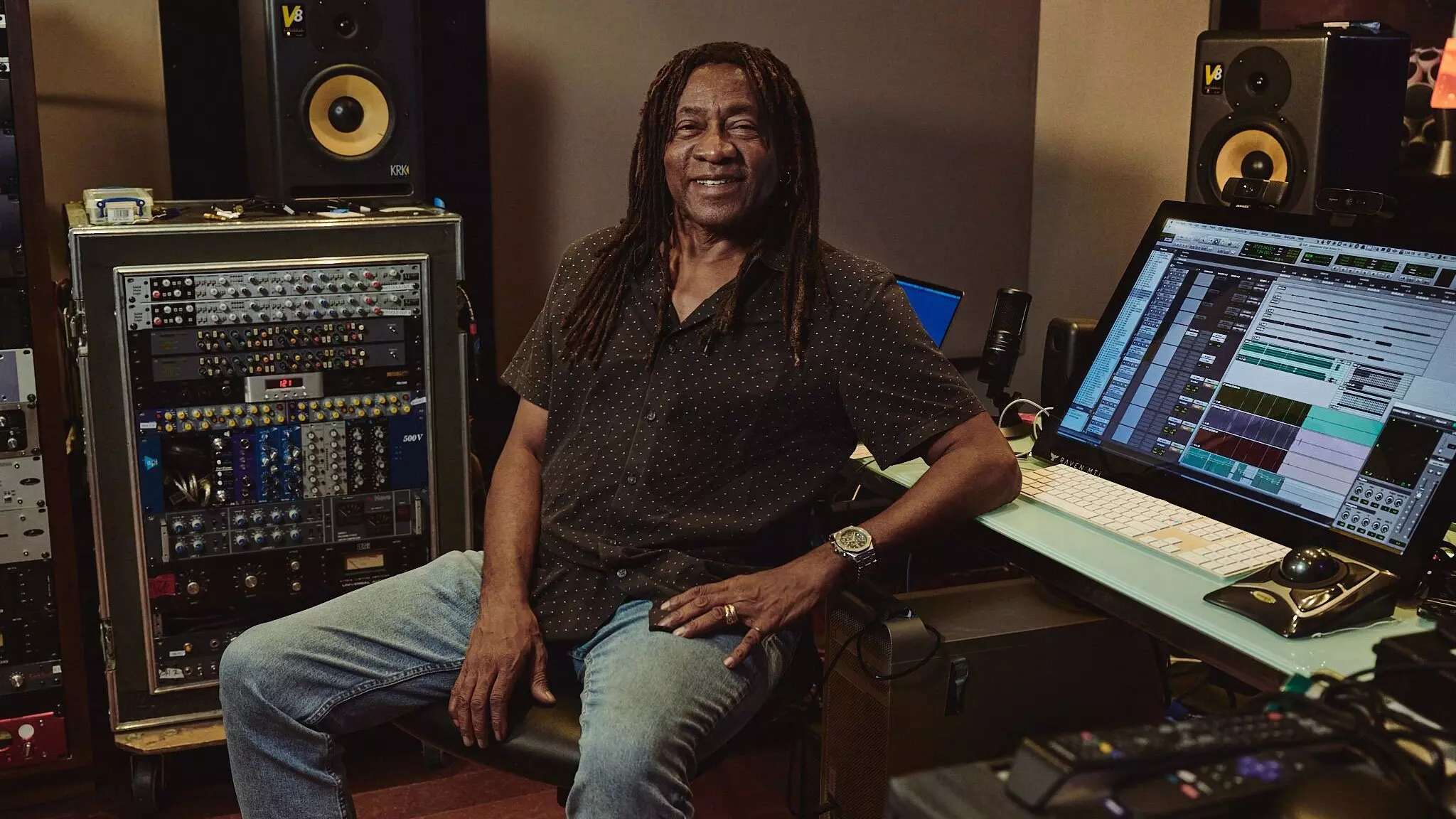
The Recording Academy Producers & Engineers Wing To Honor Jimmy Douglass During GRAMMY Week 2025 Celebration
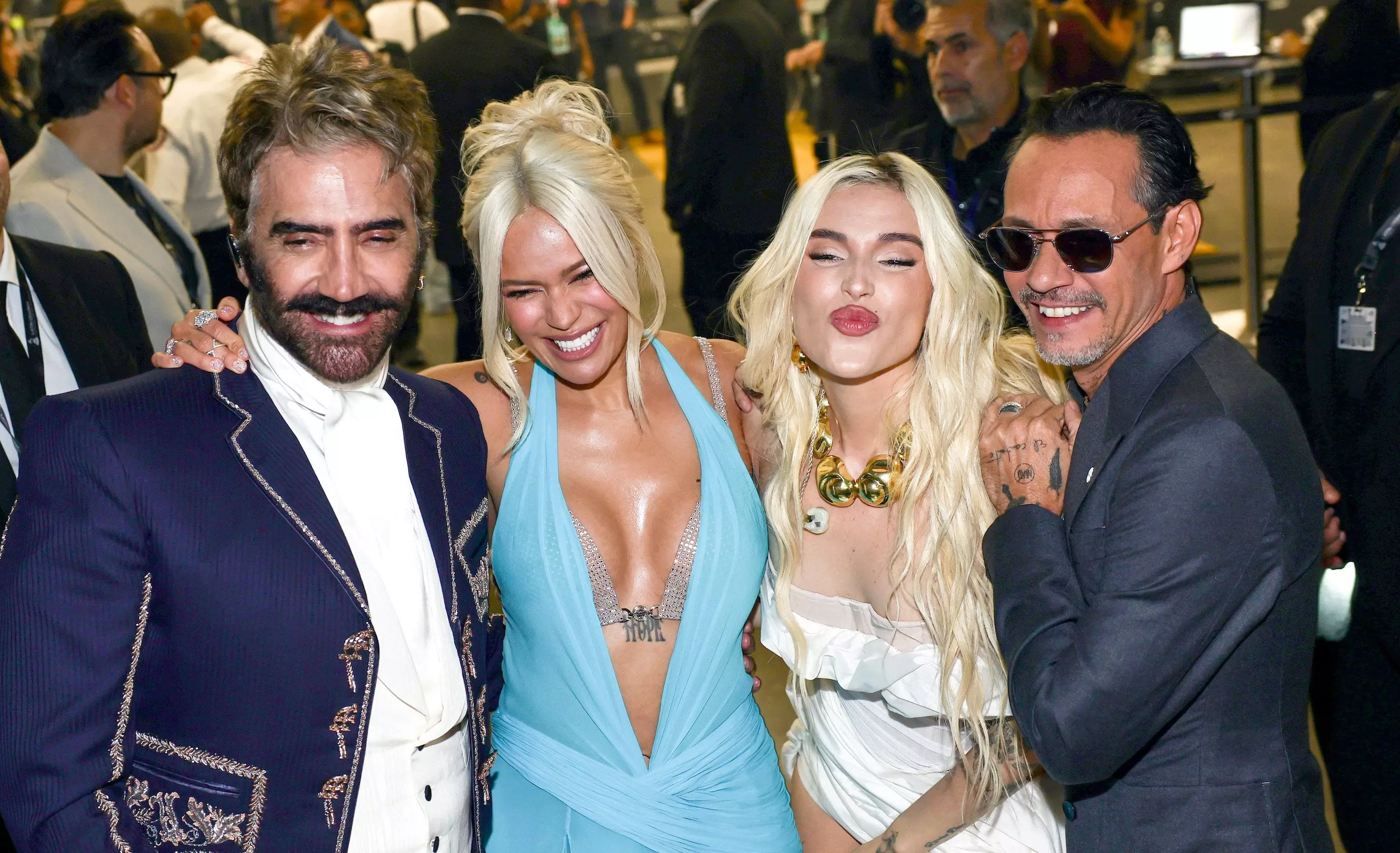
10 Meaningful Moments From The 2024 Latin GRAMMYs: Karol G's Heartfelt Speech, Tributes To Late Legends & More
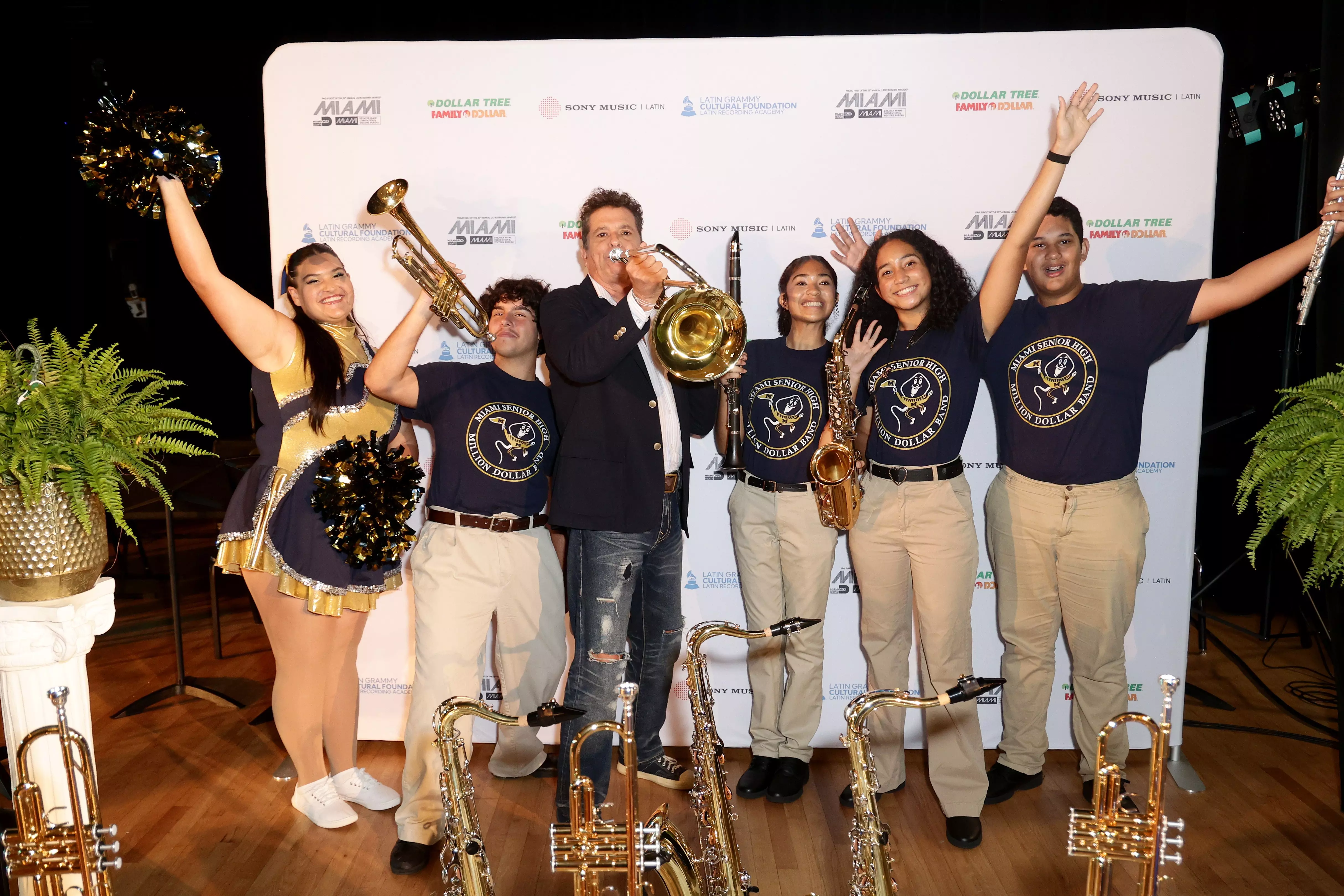
Behind The Scenes At Latin GRAMMY Week 2024: Inside VIP Celebrations & More
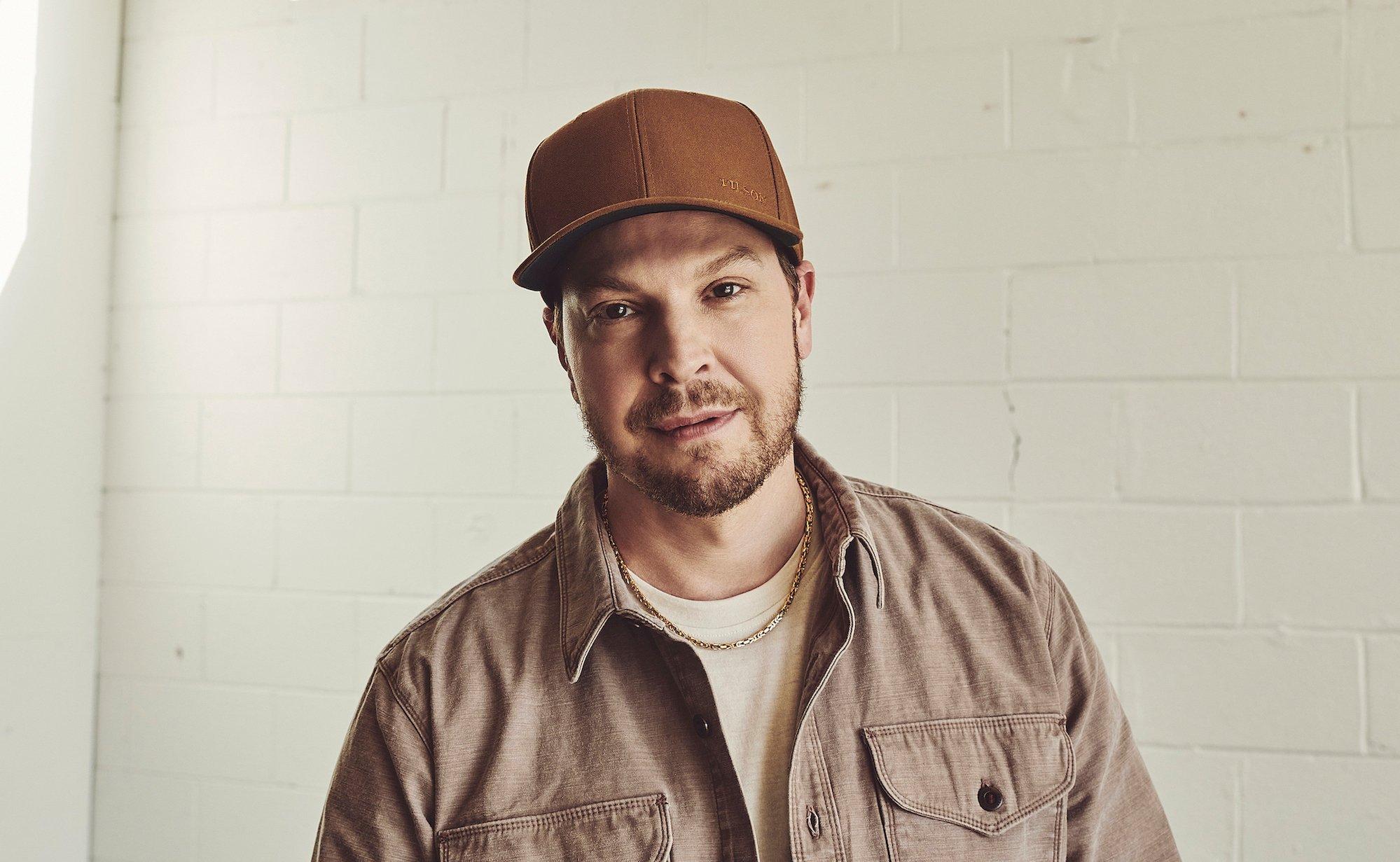
Photo: Matthew Berinato
interview
Gavin DeGraw Still Can't Believe How 'Chariot' Changed His Life
On the heels of releasing 'Chariot 20,' Gavin DeGraw looks back on his seminal debut album — from the success of "I Don't Want To Be" to Billy Joel's stamp of approval.
In May 2022, Gavin DeGraw stood on a precipice: He had just released his seventh studio album, Face the River, and completed his contract with Sony Music.
The GRAMMY-nominated singer/songwriter had free reign for his next career move. And with the 20th anniversary of his seminal debut, 2003's Chariot, on the horizon, DeGraw had an idea.**
"I've been living with these songs, and I've been fortunate enough to have success with these songs already in the past," he tells GRAMMY.com, "[so I thought], What a great opportunity to recut the songs."
Chariot 20 features re-imaginings of all 11 songs on the original album, as well as two unreleased tracks from the Chariot sessions: "Get Lost" and "Love Is Stronger (Alright)." Bringing new life to the music, Chariot 20 features lush instrumentation and playful riffs on each tune, resulting in a version of the album that's even more true to who DeGraw is as a performer.
"I've been playing these songs for so long, and I feel like the performances had actually improved, and the level of execution had escalated," DeGraw says of Chariot. "Why not take the opportunity to document that, and enjoy that, and make it sound even that much more intimate and special?"
In celebration of Chariot 20, the upstate New York native Zoomed with GRAMMY.com from a park in New York City to reflect on the impact Chariot had on his career — from allowing him to pay off student loans, to putting him on stage with his idols.
Re-recording albums has become somewhat of a trend as of late, whether it's to regain ownership or to celebrate an anniversary. Was your re-recording of Chariot simply inspired by its 20th anniversary? Or was it something more for you?
All of the above. The fact that the 20th anniversary of the record was coming up right after I had just satisfied my record deal obligations with Sony New York City, it was all great timing. Trust the universe, right?
It was just right to make this record the way we made it, and with the partners that we made it with. You know, I had just made a record just a couple years earlier, with Dave Cobb, and we had cut a record called Face The River. And I love the way the record sounded.
That was my first time working with Dave, and I thought he did such a great job. The sounds and the performances were just so authentic and so homegrown. He really captured my voice in the most authentic way. I realized that he'd be the perfect guy to recapture the Chariot record.
This recording brings new life to this album, and also a level of authenticity that I really believe in for this album. These intimate songs, luckily, had become a lot of hit songs for me, but [Dave] was able to capture these songs in an even more intimate way. It really feels just so from my mouth to your ear.
Also, it was a fun excuse to put these other new songs on that were written from that same era that didn't make the first record. One of the things that I'm excited about is the way that [my new label] Sony Music Nashville has gravitated towards those other songs from that era. Not only "I Don't Want to Be" and "Chariot," but other songs from that era that I'm proud of.
Did you have a favorite song on Chariot before you re-recorded the album? And if so, did that change once you revisited all the songs again?
Well, I'll tell you that the two that didn't quite make the first record are the two real surprises for me. But also the ones that did make the first record that surprised me probably would be "Meaning" and "Overrated." Because the recordings are so simple, and the songs really just speak. There's no tricks, it's just very simple, very authentic, very pure.
Before you actually announced the full album, you released the re-recorded version of "Chariot." In a post about it, you said, "I've changed so much, and I wanted my music to reflect this growth." What are the biggest ways you feel you've changed since releasing Chariot, whether as an artist or even a person, or maybe a little of both?
I think the main thing would be the level of confidence in your performance as an artist. There's 20 years of growth of development of your skill set and of your confidence level. And, you know, 20 years ago, you're evolving, figuring out, Who am I? What kind of record do I want to make? [Today], your voice is more lived in, more mature. [You're] just better at your craft due to your life experience.
There's just a level of living in the song now. You can hear it in the delivery: everybody is so deliberate in what they're doing, performance-wise. And all that comes from that believability.
You've talked about how you had several frustrating years where nothing was really happening for you before Chariot came along. And you were in your mid-twenties when you released it, which can be seen as "old" in this industry. When you finished Chariot, what do you remember thinking about what it could potentially do for you as an artist?
When I was putting that first record out — and even before I put that first record out — I was putting so much pressure on myself, as many people put pressure on themselves, to make a good living. Getting a record deal and making a record was a byproduct of endless hours of pursuit, and sweat, and frustration. Basically, getting my ass handed to me in real life trying to make $1 here and there playing live gigs at bars and clubs.
My motivation was, I'm broke, I want to make a living doing this. So your motivation at the very, very beginning is much simpler, right? And then, when you're not broke anymore, your motivation graduates a little bit. Now, [it's] how do I continue to grow artistically, and make a living, and express myself? How do I demonstrate that I'm improving at my craft?
I'll never forget being broke. I can't shake that feeling, and that chip on my shoulder that I had as a kid never went away. It keeps me working hard. It's motivation for me. It reminds me how lucky I am to have an opportunity. It reminds me that I'm representing where I'm from. I'm representing the people I grew up with who had the same frustrations, had the same stories. And so you're not just making music for yourself, you're making music for a culture of people.
What was the reaction like when you first released the album, and when did you kind of start to feel the shift?
Personally, I wanted "I Don't Want to Be" to be the first single and "Chariot" to be the second single, but we went with "Follow Through." When "Follow Through" wasn't getting the love we wanted to get early on, that's when I got a phone call about "I Don't Want to Be" having an opportunity to get placed on TV, which was obviously a huge, huge gift to me.
Once that song got picked up for ["One Tree Hill"], the focus switched to support the success of "I Don't Want to Be," and it fortunately proved worthwhile. We probably worked that song for a full year or so before it was a hit, and that was obviously life-changing.
I hope you had an "I told you so" moment about "I Don't Want to Be" being the right first single.
No, no, I would never do that. Because here's the way I view it. As an artist, if you're lucky enough to end up with a great partner at a record company; anything that they're embracing of yours, you're lucky they're embracing it at all. If someone at the record company chooses one song as the better choice above what you wanted, don't blame them, here's why — you're the one who recorded that song! You handed the album to them! That's on you! [Laughs.]
That's a lesson to you as the artist of, S—, maybe I need to do a better job next time if I don't believe that any one of these things could be the one. That's my problem.
Many people probably associate "I Don't Want to Be" as the "One Tree Hill" theme song. But what do you associate with that song? Is there a special memory or moment that stands out?
The main thing that I think about for that song is, that is my autobiography. I didn't write it for anything other than my real life. It was one of the songs on my album, and it happened to be the song that a show picked up, and thank God they did. But I still think about the roots of the song when I think about that song.
To add to that, that's the song that paid off my college loans. So, I'll take it!
Do you remember the moment or the time that you realized that this album had actually changed your life?
The phone call was big regarding placement, but I don't remember the exact moment where I thought, Okay, cool, I made it. Because it didn't seem to happen like that for me. I will say, the skeptic in me was worried about when the magic carpet was gonna get pulled out from under me at every moment.
Probably the biggest thing for me was getting a phone call to do the first Billy Joel show [in 2014]. Seeing him live when I was 15 years old was the deciding factor for me to become a musician for living, so when the call came in to open for Billy, that was maybe the moment I thought, Wow, my hero has invited me to play a show. This is a big deal for me.
Does he know that he's your childhood hero? Did you get a chance to tell him that he's the reason that you got into music?
I think he may know that by now. I hope he does. Doing those shows with him, opening for him, those were huge, huge validation moments for me, as a musician, as a fan, as a native New Yorker. It's like opening up for the Pope at the Vatican, playing with Billy in New York.
What are some of the most unbelievable opportunities you remember getting because of Chariot?
One of the biggest ones would probably be the Songwriters Hall of Fame event [in 2003]. I got a phone call from Phil Ramone, who's a very big producer, a legendary guy. He asked me what I'd like to do during that show and gave me a couple options. My part was performing a Phil Collins song, "Against All Odds," doing a speech, and then giving Phil Collins his award.
What an honor to be part of that. He was a lovely guy. When I walked off stage, the first person that stopped me to congratulate me on my little part of the show was Brian May from Queen. And I'm a huge Queen fan. He said something very regal as a compliment, "That was magnificent" or something that I didn't deserve, which was lovely. It made me feel good.
That night, there were so many amazing artists performing. Here's who played that night — and this is why it means so much to me. That very night, it was the first time I'd seen Billy Joel in person. He was running to the stage to go do a song in honor of another songwriter named Jimmy Webb. So he played that night. Barry Manilow played that night. Van Morrison played that night, and the guy playing piano, singing harmonies for Van Morrison, was Ray Charles. Alicia Keys played that night. Tony Bennett played that night!
I was so beside myself that I was invited to be part of this very special musical community that, at the time, and even now, I feel like, I don't deserve that. I was just so honored to be invited to be part of that, musically, artistically. What a moment for some dude in some small prison town in upstate New York who grew up playing barrooms.
To be invited to be part of that, I was pinching myself. I'll never ever forget a moment like that. A very extraordinary evening for a guy like me.
And Chariot did that for you!
Chariot did that for me. Isn't that unbelievable? Honestly, I'm still baffled by it.
The Latest Pop Music News & Releases
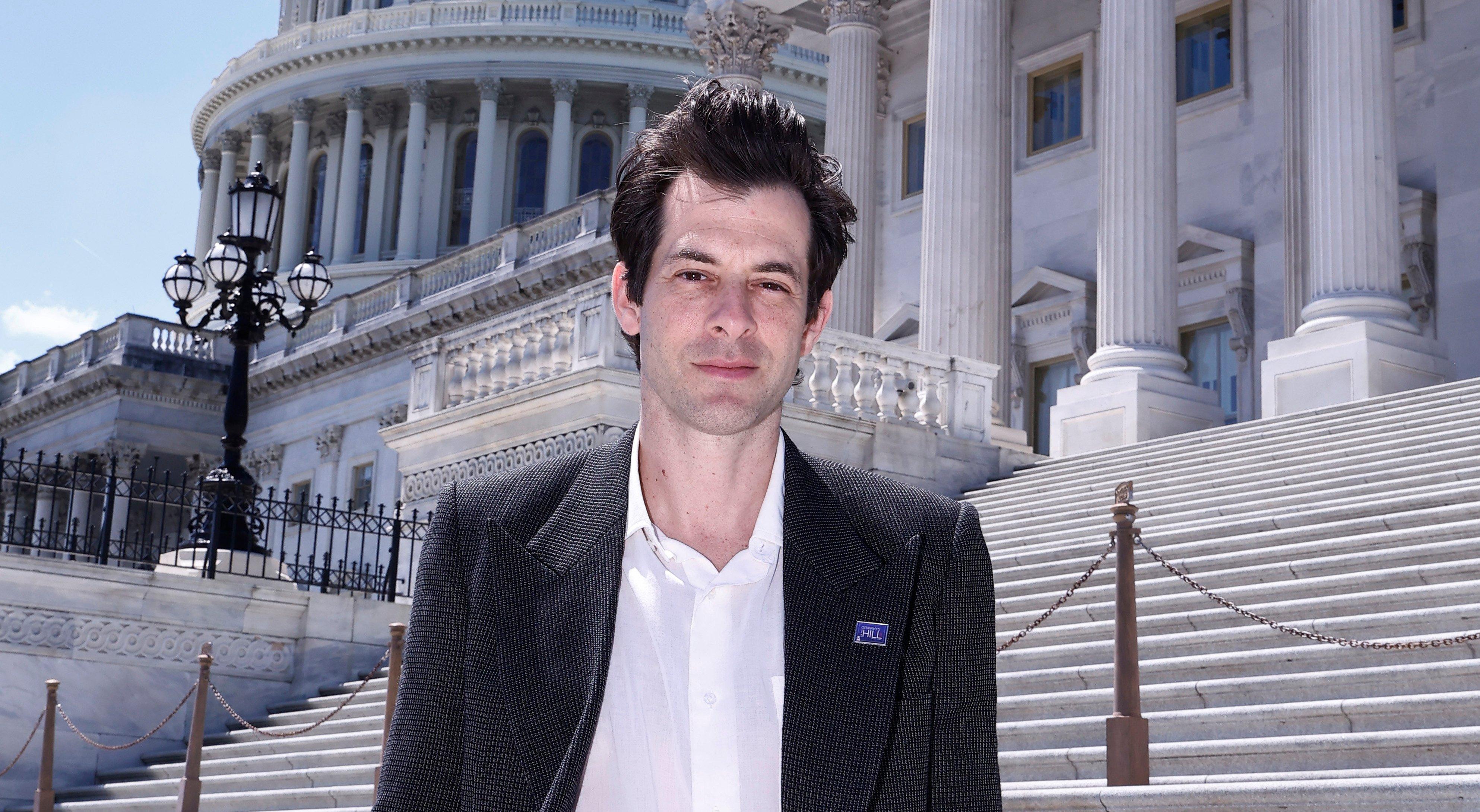
Photo: Paul Morigi/Getty Images for The Recording Academy
list
4 Ways Mark Ronson Has Advocated For The Music Community & Beyond
As the Artist Ambassador for Music Advocacy Day 2024, Mark Ronson leads the fight for creator rights. Ahead of the Oct. 1 event, take a look at some of the ways the producer has made an impact in and outside of the music industry.
Mark Ronson is the definition of a hitmaker. Over the last two decades, the British-born DJ has become one of the most in-demand producers in the music industry.
Behind the boards, he's captured lightning in a bottle with superstars like Amy Winehouse, Bruno Mars, Lady Gaga, and Dua Lipa, while also crafting a signature sound across his solo discography best known for combining Motown funk and '70s disco with contemporary pop.
Now, the eight-time GRAMMY winner has stepped into a new role as the 2024 Artist Ambassador for the Recording Academy's 10th annual Music Advocacy Day.
This year's effort has already broken a new registration record by gathering 2,130 participants, and on Tuesday (Oct. 1), Recording Academy members across 47 states, Washington, D.C., and Puerto Rico will meet with their representatives in Congress to discuss obstacles and opportunities within the music industry and drive legislative policy changes to better support artists and creators.
In a recent open letter to Academy members, Ronson pointed to the ever-increasing shifts happening within the music industry, and urged members to let their voices be heard by proactively advocating for legislation, including the NO FAKES Act to responsibly regulate the use of artificial intelligence in music, and the Fans First Act to reform live event ticketing and protect both artists and consumers.
"If there's one thing I've learned from my years in the studio, it's that music has the power to move mountains," he wrote. "It's more than just beats and lyrics; it's the heartbeat of our culture. The music industry is changing faster than ever, and with those changes come challenges. But these challenges are also our opportunities to shape the future of music."
Below, dive into more about Ronson's impact on the music industry and the ways he's championed access to music, voting rights and more over the course of his illustrious career.
Working With (And For) Amy Winehouse
By the mid-2000s, Ronson had already established himself as a well-known producer in the music industry — having released his debut studio album, Here Comes the Fuzz, in 2003 and worked behind the boards for artists like Macy Gray ("When I See You"), Lily Allen ("Littlest Things") and Christina Aguilera ("Slow Down Baby," "Hurt").
However, the London-born producer's true breakout moment arrived when he connected with Amy Winehouse to co-produce her smash sophomore album Back to Black. While Winehouse's raw lyricism and inimitable voice were both intrinsic parts of her once-in-a-generation talent, Ronson undeniably helped craft the timeless neo-soul sound of songs like "Rehab," "You Know I'm No Good" and "Love Is a Losing Game," and is even listed as a co-writer on the album's tour de force of a title track.
Back to Black rightly turned Winehouse into a superstar before her tragic passing at the age of 27. The album would go on to change the sound of popular music at large, inspire an entire generation of rising female artists, including the likes of Adele and Lady Gaga, and remain widely beloved by both critics and music lovers the world over. (In May, it was ranked No. 8 on Apple Music's list of the 100 best albums in history).
The magical collaboration between artist and producer also earned Ronson his first three GRAMMY Awards — including one for Producer of the Year, Non-Classical — and was a major stepping stone on his path to future culture-defining smashes like "Uptown Funk," "Shallow" and the Barbie soundtrack.
Following Winehouse's untimely death in 2011, Ronson has continued to honor his friend's legacy by becoming a patron of The Amy Winehouse Foundation — the charity launched by the late singer's family to help at-risk young people through music, education about substance abuse and offering other critical support.
Inspiring The Next Generation Of Music Makers
In 2017, Ronson participated in Hope and Homes for Children's End the Silence campaign to aid more than 120,000 children confined to orphanages in Uganda and Rwanda. In a video for the U.K. charity, the producer opened up about his most precious musical memory from childhood involving Grandmaster Flash and the Furious Five's trailblazing 1985 single "The Message."
"It's impossible to think of what any of our childhoods would be like [without music]," he said, "and that's why no child should have to endure life in an orphanage, deprived of love and without music and family. 'Cause that's the essence of, I think, what we need to actually get by."
In the U.S., Ronson has served as a mentor for Turnaround Arts, the John F. Kennedy Center for the Performing Arts' nationwide program to bring arts education to low-performing schools. In his role, the DJ became the Artist in Residency at Sierra Preparatory Academy in Santa Ana, California. Visiting the school in 2019, he invited the Sierra Prep jazz band to learn about the recording process in a professional studio, and helped them record a cover of Ben E. King's "Stand By Me."
"No Time to Die" For Voting Rights
the bond song that never was for the bond film I hope we get to see someday. only available today with all net proceeds going to @votingrightslab https://t.co/aBDy5Vdx2n pic.twitter.com/4SyStGwXZK
— Mark Ronson (@MarkRonson) October 2, 2020
Leading up to the 2020 presidential election, Ronson reached into his vault and dusted off "No Time to Die (Bond Demo)," the demo he crafted with songwriter Ilsey Juber for the 2021 James Bond film of the same name.
Ultimately, producers didn't select Ronson's "No Time to Die" demo as the theme for Daniel Craig's final turn as 007 (instead, that honor went to Billie Eilish's GRAMMY- and Oscar-winning ballad, also titled "No Time To Die"). But the producer lent his prospective Bond theme to an even worthier cause: saving democracy,
"No Time To Die (Bond Demo)" was included on Good Music to Avert the Collapse of American Democracy, Volume 2, a massive 77-track benefit compilation of previously unreleased recordings that raised money during the pivotal election cycle for Voting Rights Lab — a nonprofit dedicated to "accelerating the movement for free and fair elections through expert analysis, research and innovations."
Additionally, the nonpartisan organization employs its State Voting Rights Tracker dashboard to keep track of election-related legislation and current state laws regarding everything from mail voting and voter registration to interference with election administration and the purging of voter rolls in all 50 states in the country as well as Washington, D.C.
Urging Washington Leaders
Prior to becoming the Artist Ambassador for Music Advocacy Day, Ronson headed to Washington, D.C. to participate in The Recording Academy's GRAMMYs on the Hill initiative.
While visiting the nation's capital last May, the producer and the rest of the delegation from The Recording Academy met with top members of the Biden-Harris administration at the White House to discuss issues like artificial intelligence protections for musicians and ticketing reform — both key issues of this year's Music Advocacy Day.
Ronson and Recording Academy CEO Harvey Mason jr. then held meetings with Senate Majority Leader Chuck Schumer (D-N.Y.) and other lawmakers in Congress to discuss legislation affecting the music industry and advocate for other artists and the industry at large.
"I saw firsthand the impact of sharing our stories with the people who represent us," Ronson recalled in his recent letter to Academy members. "Those conversations helped lead to meaningful outcomes on Capitol Hill, including the passage of the TICKET Act in the House, and the introduction of the NO FAKES Act in the Senate. Now, on Music Advocacy Day, we can build on the progress we've made and speak with our Congressional leaders at home in our local communities to ensure they hear our concerns."
Latest Recording Academy News & Initiatives

Your Vote, Your Voice: 6 Reasons Why Your GRAMMY Vote Matters

How To Vote In The 2025 GRAMMYs: A Complete Final Round Voting Guide For GRAMMY Voters

The Recording Academy Producers & Engineers Wing To Honor Jimmy Douglass During GRAMMY Week 2025 Celebration

10 Meaningful Moments From The 2024 Latin GRAMMYs: Karol G's Heartfelt Speech, Tributes To Late Legends & More

Behind The Scenes At Latin GRAMMY Week 2024: Inside VIP Celebrations & More



